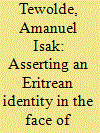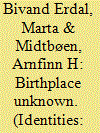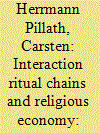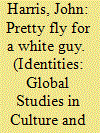| Srl | Item |
| 1 |
ID:
190121


|
|
|
|
|
| Summary/Abstract |
The issue of otherness in the social construction of ethnicities and rural multiculturalism has long attracted the attention of scholars. By following a postcolonial background, this paper investigates the social construction of Roma as ‘other’ in a multicultural landscape (the Romania-Serbia border) using interviews with participants of different ethnic groups. This paper addresses the following questions: (i) Is the Roma population in this area completely spatially segregated? (ii) How do different kinds of prejudice against Roma operate within this multicultural context? (iii) How does discrimination against the Roma interface with power relations, in particular political power in the area? The findings indicate that, alongside ethno-nationalist racism, Roma face prejudice from apparently more ‘progressive’ groups, who accept multiculturalism, yet blame the Roma for their own disadvantaged social and economic position on the grounds of a failure to integrate that is pictured as ‘backward’.
|
|
|
|
|
|
|
|
|
|
|
|
|
|
|
|
| 2 |
ID:
190118


|
|
|
|
|
| Summary/Abstract |
Current literature on Eritrean national identity has been dominated by debates on its function as a unifying and homogenising civic identity in a context of a multi-ethnic, multi-religious and multi-clan national context. Little is known, however, about how an Eritrean national identity is mobilised among Eritreans living in racially organised host societies. This paper addresses this lacuna by examining how Eritrean refugees living in a racially classified South African host society self-identified. The focus of analysis for this paper was how an Eritrean national identity was mobilised by some participants in the face of experiencing racial classification. Some individuals defined themselves as ‘Eritrean’ to resist their classification as ‘Black’ in everyday life. I argue that beyond functioning as a homogenising and unifying civic identity, an Eritrean national identity functioned as a bulwark against ascribed racial classification in a race-conscious South African host society,
|
|
|
|
|
|
|
|
|
|
|
|
|
|
|
|
| 3 |
ID:
190117


|
|
|
|
|
| Summary/Abstract |
When naturalised citizens receive their passport, it is material and symbolic proof of membership in the nation-state, tying the individual to the nation and providing mobility resources. For naturalised Norwegian citizens, their birthplace appears in the passport. What might be the implications of removing this information? In 2016, the Norwegian government replaced birthplace details with ‘birthplace unknown’ in the passports of naturalised citizens from 31 Asian and African countries. Drawing on this case and 41 in-depth interviews with people of different citizenship-statuses, we analyse the role of the passport and birthplace information in it for naturalised citizens’ identity-construction. The procedural change led to an experience of devalued citizenship in practical, emotional, and symbolic ways, by those directly affected and others, showing the precariousness of identity for naturalised citizens. We find that the passport matters for identity-construction, as a symbol of national belonging, and suggests more-than-instrumental approaches to citizenship among immigrant populations.
|
|
|
|
|
|
|
|
|
|
|
|
|
|
|
|
| 4 |
ID:
190120


|
|
|
|
|
| Summary/Abstract |
This paper explores the theory of ‘interaction ritual chains’ proposed by the sociologist Randall Collins in understanding popular religion in China today. It contributes to ongoing conceptual debates over approaching Chinese religions and draws conclusions for general socio-economic theory. We concentrate on the specific phenomenon of the resurgence of ancestor worship and lineage rituals which we have explored in fieldwork done in Shenzhen metropolis. We study two empirical cases, the re-emergence of ritual spaces that project the ritual infrastructure of the traditional village onto the modern urban infrastructure, and the role of the internet in mediating ritual activities between the local and the global.
|
|
|
|
|
|
|
|
|
|
|
|
|
|
|
|
| 5 |
ID:
190122


|
|
|
|
|
| Summary/Abstract |
While populism is one of the most analysed aspects of contemporary politics, we know little about its interaction with religion and about motivations leading political parties to oppose or support a secular appropriation of religious themes and symbols beyond any spiritual or doctrinal dimension. This paper aims to disentangle the intersection of religion and populism in Romania with regard to the concept of family, by exploring how parliamentarians use religious symbols and contents within their speeches during the debates preparing the 2018 referendum on family in Romania. The analysis is based on a dataset of parliamentary debates covering the adoption of the referendum in the Parliament (2012–2018) and the follow-up period (2018–2020). We aim to provide a nuanced understanding of how political actors conceive and represent religion and gender in contemporary politics based on a case-study in which overtly populist parties remain isolated in the extra-parliamentary arena.
|
|
|
|
|
|
|
|
|
|
|
|
|
|
|
|
| 6 |
ID:
190116


|
|
|
|
|
| Summary/Abstract |
In 2008 Joe Calzaghe (from Wales) fought Bernard Hopkins (from the USA) in a light-heavyweight boxing match. Prior to the fight Hopkins had taunted Calzaghe with the refrain that he would never lose to a white boy. This paper assesses the interplay of discourses surrounding race and nation in the build-up to the contest between the two boxers. The analysis highlights how simplistic binaries are used to perpetuate notions of difference and considers how this accentuates divides in contested racial and national terrains.
|
|
|
|
|
|
|
|
|
|
|
|
|
|
|
|
| 7 |
ID:
190119


|
|
|
|
|
| Summary/Abstract |
Recent critiques of integration and superdiversity scholarship pointed out a need to pay more attention to the positioning of established residents, also referred to as 'the mainstream', and to develop novel understandings of urban residents’ reactions to and contestations of the presence of newcomers. Drawing on ethnographic insights from 2015 in a large German city, this article identifies a spectrum of reactions to the installation of a large reception centre for asylum seekers among residents involved in a neighbourhood renewal programme. It delineates how established residents themselves mobilize an integration discourse, associate newcomers with an economic burden and rely on the state for integrating them. Drawing on the notion of ‘Emplacement’, the article highlights how established residents’ occupation with newcomers' integration can be understood in relation to their activity of carving out their place in contemporary diverse and stratified urban environments.
|
|
|
|
|
|
|
|
|
|
|
|
|
|
|
|